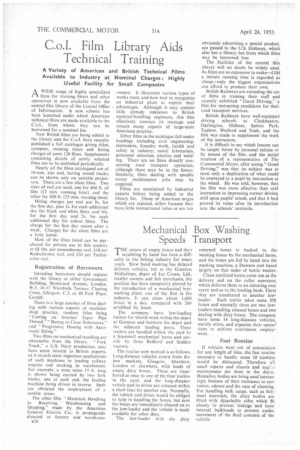C.o.I. Film Library Aids Technical Training
Page 60

If you've noticed an error in this article please click here to report it so we can fix it.
A Variety of American and British Technical Films Available to Industry at Nominal Charges: Highly Useful Facility for Small Companies
AWIDE range of highly specialized films for training fitters and other operatives is now available from the central film library of the Central Office of Information. A new scheme has been launched under which American technical films are made available to the C.o.1., from whom they can be borrowed for a nominal fee.
New British films are being added to the library and the C.o.!. have recently published a full catalogue giving titles. synopses, running times and hiring charges of some 120 films. Supplements containing details of newly selected films are to be published periodically. Nearly all the films catalogued are of 16-mm. size and, having sound tracks, can be shown only on suitable projectors. There are a few silent films. Two sizes of reel are used, one for 400 ft. of film (l2 min. running time). and the other for 800 ft. (25 min. running time). Hiring charges per reel are 5s. for the first day, plus Is. for each additional day for black and white films. and 10s. for the first day and 2s. for each additional day for colour films. The charge for the first day recurs after a week. Charges for the silent films are a little lower.
Most of the films listed can be purchased for private use in this country at £8 10s. per monochrome reel, £18 per Kodachrome reel, and £20 per Technicolor reel.
Registration of Borrowers
Intending borrowers should register with the library at either Government Bromyard Avenue, London. W.3, 16-17 Woodside Terrace; Charing Cross, Glasgow, C.3. or 48 Park Place. Cardiff.
There is a large number of films dealing with various aspects of machineshop 'practice, random titles. being " Cutting an Internal Taper Pipe Thread,"" Boring to Close Tolerances," and ," Progressive Honing with Automatic Sizing."
Two films on mechanical handling are obtainable from the library. " Fork Truck," a U.S. Navy production, may have some interest to British experts, as it reveals some ingenious applications of such machines to loading railway wagons and stacking in warehouses. For example, a crate some 15 ft. long is shown being carried by two fork trucks, one at each end, the leading machine being driven in reverse. Such use obviated the employment of a mobile crane.
The other film, " Materials Handling in Receiving. Warehousing and Shipping,"• made by the American General Electric Co., is propaganda directed at factory and warehouse a26 owners. It illustrates various types of works truck and how best to reorganize an industrial plant to exploit their advantages. Although it may contain little already unknown to British material-handling engineers, this film effectively conveys its message and reveals many aspects of large-scale American practice.
Other films in the catalogue fall under headings including civil engineering, electronics, foundry work, health and safety in industry, metal fabrication, personnel selection, plastics and welding. There are no films directly concerning road transport operation, although there may be in the future. Similarly, films dealing with specific motor maintenance jobs may be acquired.
Films are scrutinized by industrial experts before being added to the library list. Those of American origin which are rejected, either because they have little instructional value or are too obviously advertising a special product, are passed to the U.S. Embassy, which also has a library but from which films may be borrowed free.
The _facilities of the central film library will no doubt be widely used. As films are so expensive to make—L100 a minute running time is regarded as cheap—only the biggest organizations can afford to produce their own.
British Railways are extending the use of films in training their staff and recently exhibited " Good Driving," a film for instructing candidates for their road transport services.
British Railways have well-equipped driving schools at Cleckheaton, Darlington, Oldham, Sutton Park, Taplow, Watford and York, and the film was made to supplement the work of the instructors.
It is difficult to say which lessons can he, taught better by personal tuition or by means of the film, and the initial reaction of a representative of The Commercial Motor, after seeing "Good Driving," was that its subject was at most only a duplication of what could be conveyed to a pupil by instruction at the wheel. He was told, however, that the film was more effective than oral instruction in impressing correct driving drill upon pupils' minds, and that it had proved its value after its introduction into the schools' curricula.




































































































